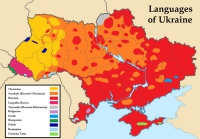
What language was spoken in Kiev in prehistoric times?
What language was spoken in Kiev in prehistoric times? It certainly was not the modern literary language. Any literary language is artificial to some extent, it is worked out by writers, educators, cultural figures by interpreting the living language. It is not uncommon that literary language seems strange, borrowed or even unintelligible for uneducated people. Thus, in the 10th - 18th centuries the Ukrainized Old Bulgarian language was considered the literary language in Ukraine. Most literary monuments, such as “Svyatoslav’s Izbornik”, “Lay of Igor”, “Tale of Bygone Years”, works by Ivan Vishensky, Grigory Skovoroda, etc were written in this language. The literary language was not stagnant, it was constantly developing and changing, it was enriched with foreign words, its grammar was getting simpler. The degree of Ukrainization depended on authors’ erudition and freethinking as the church did not approve of people’s words penetrating written texts. This literary language based on Old Bulgarian played a huge part in the creation of the Great Russian language. The modern literary language was formed on the basis of the Dnieper Region dialects and Eastern Slavic tribes’ languages and later developed by the 19th century Ukrainian writers such as Kotlyarevsky, Grebinka, Kvitka-Osnovyanenko and Taras Shevchenko. So, before the national language was formed the Ukrainians had spoken various local dialects, while in writing they used Ukrainized Old Bulgarian. During the princely period the people in Kiev spoke the understandable to everybody language based on various old Ukrainian tribal dialects, mainly that of the polyans (Eastern European tribe). This language has not been preserved, we can judge about it only by the mistakes made by ancient copyists as well as by some modern Ukrainian local dialects. To imagine it, it is necessary to combine the grammar of the trans-Carpathian dialects in which ancient forms have been preserved most, diphthongs from the Chernigov region which have substituted the letter “yat”, the “deep” pronunciation of vowel sounds characteristic of modern inhabitants in the south of Kiev, Poltava and Cherkassy regions. Would modern Ukrainians be able to understand the language spoken by their ancestors who lived in the 13th century? Definitely, yes. For the ”modern” ear it would sound like a peculiar Ukrainian dialect, similar to those we hear on markets, construction sites, in commuter trains.
Can we name this ancient language “Ukrainian” if the very word
“Ukraine” did not exist then? We can name this language as we like,
the point remains the same and the laws of the language evolution do
not depend on the language name which is used at certain historical
periods. We do not know what ancient Slavs called their language,
maybe their language did not have its name at all. We do not know what
eastern Slavs called their language in the prehistoric epoch. Every
tribe must have had its own name and corresponding language name. The
word “Russian” as applied to the language appeared rather late. First,
it stood for the language of common people as opposed to literary
“Slavic” language. Later “Russian” language was contrasted to the
Polish or Moscow languages, as well as to non-Slavic languages spoken
by neighboring nations. Thus Ukrainian language was termed “Russian”
up to the 18th century.
The word of “Ukraine” is also quite new though in chronicles it was
mentioned still in the 12th century.




